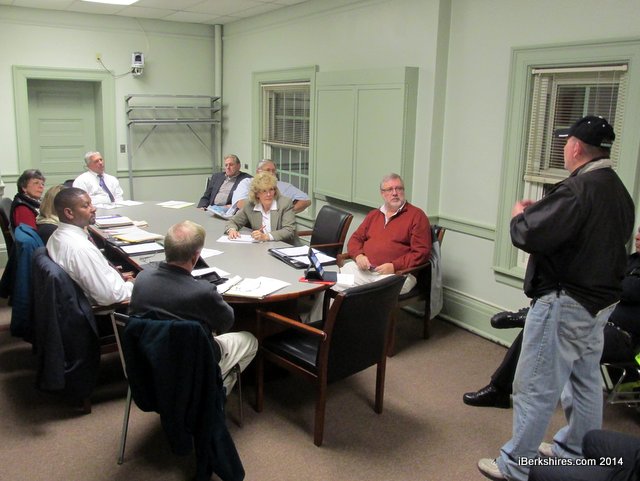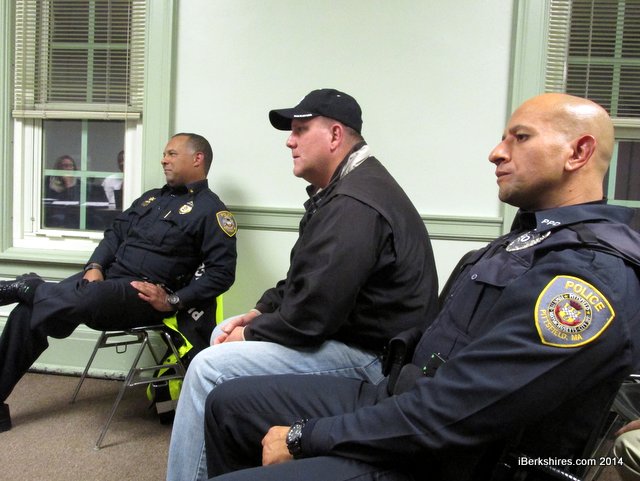Pittsfield Police Advisory Hears From Anti-Crime UnitBy Andy McKeever, iBerkshires Staff
01:39PM / Tuesday, November 04, 2014 | |
 Sgt. Glen Decker heads the anti-crime unit, which is a mix between the gang and drug units and the patrol unit. Sgt. Glen Decker heads the anti-crime unit, which is a mix between the gang and drug units and the patrol unit. |
PITTSFIELD, Mass. — About a dozen police officers spend part of their weekly hours working in what is broadly termed the "anti-crime unit."
"It is a zero tolerance," Sgt. Glen Decker, who heads the unit, told the Police Advisory Committee on Monday. "It is for the quality of life in Pittsfield. It is getting after everything."
Officer Eliezer Garcia says one way to look at the unit is its similarities with the infamous Al Capone arrest. When police couldn't get the known gangster on any major crimes, he was ultimately arrested on tax evasion.
In Pittsfield, the anti-crime unit makes a lot of those kind of arrests but — in plainclothes — scoping out known criminal's cars and locations, catching them on smaller crimes.
"You pull them over on minor infractions," Garcia said. "You may not get them for the drug house but you get them put away for the gun that is in the vehicle."
In this calendar year the part-time unit has made 140 arrests. According to Police Chief Michael Wynn, the unit saw a resurgence eight years ago when Decker, a former drug investigator, wanted to move to patrol. Wynn said the department opted to use his experience in restructuring the anti-crime unit.
The unit handles much of the work that the drug and gang investigators don't have the time to do. Those detectives will be focused on building a certain number of cases and tend to be focused on bigger charges.
The anti-crime unit, which includes some members from the Berkshire County sheriff's department, walks a line between those investigations and a normal patrol.
"It has been working that way for eight years and it has been working really well," Wynn said, characterizing it as a "high impact" unit.
"When we go out, the goal is to sit on residences and apartments where they hang out. We know what kind of cars they drive," Decker said.
The unit receives some funding through the Charles E. Shannon Grant, which is intended to reduce gang violence. But, gangs and drugs are all part of a certain criminal culture, said Garcia, so the unit ends up handling an array of cases.
"Most of the gang stuff is drug related," Decker said. "A lot of the time is spent on gang activity. But it does lead us to other directions as well. ... We are out there working on the gang activity every time we go out."
Decker has been with the department for more than 20 years, so he and the Police Advisory Committee discussed the changes he's seen. Those changes detail the need for the unit.
In 1990s, most of the drug deals were happening on street corners, in cars and generally in the open. Decker said Pittsfield had become one of the first departments to sell drugs to users and then arrest them. That was intended to reduce the demand for the drugs.
Then there wasn't quite the gang presence and those selling on the streets weren't affiliated with known crime organizations.
But those people convicted were recruited into gangs while in state prison and, learning from their lessons, returned to the area as gang members with new ways to avoid detection.
"It is not as open anymore. The whole evolution has changed," he said. "The drug dealers and buyers adapted."
The deals moved inside and created a new threshold of probable cause needed for warrants. Decker told a story of being frustrated with houses at which he watched known addicts running in and out of but didn't have enough for a warrant. If an informant doesn't get into that known house, the detectives don't have enough to go on. He has knocked on doors and told dealers that he was watching them but couldn't actually search the location.
Not only have the crimes moved inside, there is a bigger gang presence. And the drugs have changed.
"Right now heroin is terrorizing this community and other communities," he said.
 Chief Michael Wynn, Sgt. Glen Decker and Officer Eliezer Garcia met with the Police Advisory Committee on Monday. Chief Michael Wynn, Sgt. Glen Decker and Officer Eliezer Garcia met with the Police Advisory Committee on Monday. |
Wynn said opioids have been prescribed to alleviate pain for years and that grew the number of addicts. It has only been in recent years that law enforcement and health officials started to focus on the addiction issue, he said, which includes the forming of an opioid task force.
"It wasn't until law enforcement, the district attorneys in particular, said you've created another problem." he said. "We have a lot of catching up to do. It was a bad habit for a decade."
False prescriptions for pain pills has grown. Decker said some 15 reports of stolen narcotics are made to police each week, with some of those being from addicts looking for a new prescription. He said he's seen the same people report their drugs stolen multiple times a year.
"A lot of these people will come in multiple times a year. They'll come in three or four times a year," he said.
Meanwhile in the Springfield area, heroin is cheap while prescription pills are now more expensive. Recent changes in laws for doctors and prescription monitoring has helped to drive the cost of pill up even more.
"A lot of people have switched from the prescription drugs to heroin," Decker said.
That leads to more dealer from out of town coming to Pittsfield to make easy money. Others with gang affiliation move here for good. With a demand for various drugs, prostitution and guns, they make money here.
Decker there are a lot of guns being stolen in Pittsfield. Those guns often get shipped off to other parts of the country. And there are guns stolen from other parts of the county in Pittsfield. He said there are a lot of guns being stolen locally.
Families with gang ties who stay here, often act as they did in heavy gang areas. When the children go to school, they intimidate others into either joining their gang or joining a rival so as to be protected.
"They want to live a good life and they want to have a nice things for their kids. But it takes one bad apple," Garcia said.
He said all of the crime is based on money so selling drugs comes with guns and prostitution.
"It all coincides together. It is not just gangs. The gang mentality now is a culture," he said. "There are so many tentacle to this octopus."
Decker said gang members are also more violent. In the 1990s, a suspect wouldn't fight the police during an arrest, now they do.
"There is no respect. The respect is out the window at an early age for law enforcement," he said. "The violence in the city has gone through the roof."
Wynn said it isn't the number of violent crimes but rather the severity. When police used to respond to shots being fired, it was people shooting at cars to intimidate others. Now, teenagers are seeking others out to shoot them.
"The amount of violence hasn't exploded but the degree of violence has," Wynn said.
With gang and drug investigators focusing on the big cases, they need some officers to serve warrants and watch suspected building. That keeps the anti-crime unit running from call to call to call when they are on.
| 
 MEMBER SIGN IN
MEMBER SIGN IN
 MEMBER SIGN IN
MEMBER SIGN IN